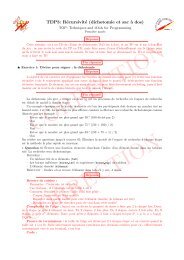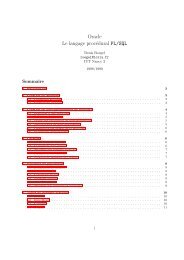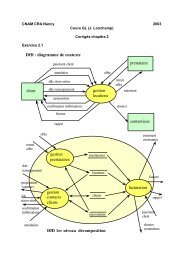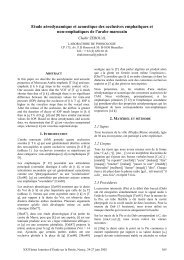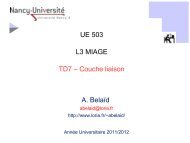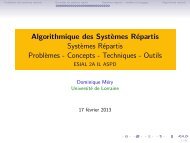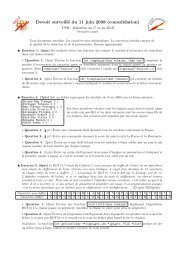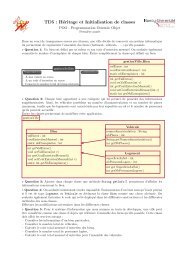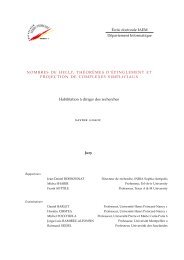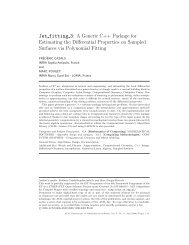Logical Analysis and Verification of Cryptographic Protocols - Loria
Logical Analysis and Verification of Cryptographic Protocols - Loria
Logical Analysis and Verification of Cryptographic Protocols - Loria
You also want an ePaper? Increase the reach of your titles
YUMPU automatically turns print PDFs into web optimized ePapers that Google loves.
30 CHAPTER 2. PROTOCOL ANALYSIS USING CONSTRAINT SOLVING<br />
Definition 7 (most general unifiers) Let H be an equational theory, <strong>and</strong> let U be a Hunification<br />
system. A substitution σ is a most general H-unifier <strong>of</strong> U if <strong>and</strong> only if there<br />
exists a minimal complete set Σm <strong>of</strong> H-unifiers <strong>of</strong> U, such that σ ∈ Σm.<br />
Definition 8 The equational theory H is <strong>of</strong> unification type<br />
Unitary if for every satisfiable H-unification system U, there exists a minimal complete<br />
set <strong>of</strong> H-unifiers with cardinality 1.<br />
finitary if for every satisfiable H-unification system U, there exists a minimal complete<br />
set <strong>of</strong> H-unifiers with finite cardinality.<br />
infinitary if for every satisfiable H-unification system U, there exists a minimal complete<br />
set <strong>of</strong> H-unifiers, <strong>and</strong> there exists an H-unification system for which this set<br />
is infinite.<br />
zero if there exists an H-unification system that does not have a minimal complete set<br />
<strong>of</strong> H-unifiers.<br />
The equational theory ∅ is <strong>of</strong> type unitary, that is, when H = ∅, given a satisfiable<br />
set <strong>of</strong> equations U = {ui<br />
?<br />
=∅ vi}i∈{1,...,n}, U has a unique most general unifier,<br />
denoted by mgu(U) [21]. If H is finitary, then the set <strong>of</strong> all H-unifiers <strong>of</strong> a given<br />
H-unification system can always be represented as H-instances <strong>of</strong> finitely many<br />
unifiers. The commutativity is a finitary equational theory that is not unitary<br />
[21]. A finite representation <strong>of</strong> all H-unifiers via H-instantiation is not always<br />
possible for equational theories <strong>of</strong> type infinitary <strong>and</strong> zero. The associativity<br />
theory is an<br />
�<br />
example <strong>of</strong> infinitary equational theory [21], <strong>and</strong> the equational<br />
theory H = x.(y.z) · = (x.y).z, x.x · �<br />
= x is <strong>of</strong> type zero [20, 184].<br />
2.1.8 Finite variant property<br />
We define in this section what means an equational theory H has the finite variant<br />
property. The finite variant property has been intially introduced in [86].<br />
Definition 9 (finite variant property) Let H be an equational theory generated by a<br />
convergent rewrite system R. We say that H has the finite variant property if for<br />
any term t, there is a finite set <strong>of</strong> substitutions Σ(t) such that for any substitution σ,<br />
there exists a substitution θ ∈ Σ(t), <strong>and</strong> a substitution τ verifying (σ)↓ = θτ <strong>and</strong><br />
(tσ)↓ = (tθ)↓τ. The substitutions in Σ(t) are called variant substitutions <strong>of</strong> t. We say<br />
that R has the finite variant property if H has that property.<br />
It is easy to see that the variant substitutions <strong>of</strong> any term t are in normal form.<br />
The finite variant property <strong>and</strong> its application for cryptographic protocols are<br />
analysed in more details in Chapter 5.



